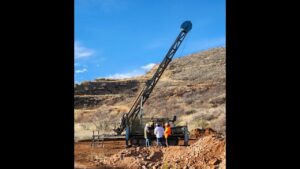Mexico, with a long and rich history of mining, is home to some of the largest mines in the world! It is currently the largest global producer of silver. The country is also one of the world’s top producers of fluorite, bismuth, celestite, sodium sulphate, wollastonite, lead, molybdenum, diatomite, cadmium, graphite, baryte, salt, gypsum, manganese, and zinc.
Still, vast, unexploited reserves of gold and other minerals exist throughout Mexico. And, juxtaposed against a dearth in domestic mining expertise and technology, the country presents ample opportunities for foreign investment. According to the Servicio Geológico Mexicano website, there are nearly 450 active mining projects attracting foreign capital in Mexico today—in varying stages of exploration, development, or production—and continues to prospect for more foreign investment.
For Australian mining companies—recognized throughout the world for their expertise and technology—there appears a significant opening to not only invest in mining properties in Mexico, but also to tap into the strong and growing demand for the Australian supply of technology and services in this sector. In fact, there are already a number of Australian mining companies active in Mexico, including Rio Tinto and Azure Minerals, leading the charge. Others include Evrim Resources, Intrepid Mines, Auricup Resources, and Australian Minerals.
While Mexico has taken major strides to improve its business climate in order to attract more foreign investment, Australian mining companies interested in entering the country must still navigate a myriad of legalities and conduct critical due diligence. Before acquiring any mining asset or interest in the country, there are important early considerations to note.
Regulatory Framework for the Mexican Mining Sector
The regulatory framework for the Mexican mining sector has undergone some major changes through the years. Under the previous mining legislation, companies were subjected to a complex web of rules and requirements and foreign investors were limited to ownership of only 49 percent of the shares of a Mexican company engaged in mining activities. The recent foreign investment law in Mexico, however, has eliminated those prior restrictions on foreign participation in mining activities and now allow for foreign investors to participate in 100 percent of the shares of mining companies. In addition, the current law requires that mining companies be incorporated under the laws of Mexico, to include exploration or exploitation of minerals under their corporate purpose, and to establish their corporate domicile within the country.
The federal Mexican Mining Law regulates all mining activities in the country and governs the grant, use, expiration, and cancellation of mining concessions. In addition, mining companies are governed by both the water and environmental protection legislations.
Mining Concessions and Filing Procedures in Mexico
In Mexico, mining concessions can be granted to Mexican companies that are owned by foreign investors, albeit these companies must be domiciled in Mexico and their bylaws should cover the exploration or exploitation of minerals and substances. Although foreign participation in the ownership of such companies must also comply with provisions of the Foreign Investment Law, it currently does not impose any specific limitations with respect to mining.
Mining concessions may be secured either through a public bid or by an application process filed by the interested party to the relevant government agency. Mining concessions are usually granted for an initial term of 50 years, which may be extended for an additional length of time. A company applying for a mining concession must also identify the specific minerals, as well as the exact location where it intends to mine. The application fee for a mining concession will depend upon whether it is an exploration or an exploitation concession, as well as upon the area it covers. It is also noteworthy that public bids apply only when the government considers it necessary to exploit certain mining reserve areas.
Environmental Considerations in Mexico’s Mining Laws
Mexican mining laws interrelate with the country’s environmental laws. Under the Mexican Mining Law, concessionaires must adhere to federal environmental regulations, where their activities are subject to an environmental review. All mining companies are required to prepare and file an environmental impact statement for all extractive operations, as well as for exploration work, which must be approved by the relevant regulatory authorities.
Interestingly, with environmental issues taking centre stage in the mining sector, some mining companies in Mexico have even started to invest in auxiliary areas of environmental responsibility, such as reforestation projects, environmental audits and certification, and residual management systems, among others.
Taxes, Royalties, and Duties for Mining Interests in Mexico
Companies with title to mining concessions may be subject to several mining taxes, royalties, and duties. It is therefore important for investors to also obtain appropriate accounting and taxation advice in relation to their investment.
Conclusion
Mexico is regarded as one of the world’s leading mining nations and in large part this is due to its attractive regulatory regime for foreign investment and participation in the mining sector, along with low labor costs. Mexico’s undeveloped mineral resources and major strides to improve its business climate should not be insignificant to Australian companies looking to expand and invest. Of course, as in all critical investment decisions, various factors beyond the regulatory scheme will need to be taken into consideration, as more often than not the difference between good and bad investment decisions is the right information at the right time.



















